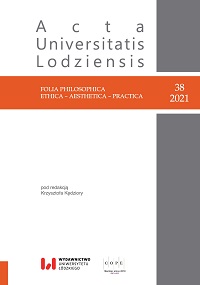Rationalität als Bedingung für individuelle Rechte in David Gauthiers "Morals by Agreement"
DOI:
https://doi.org/10.18778/0208-6107.38.06Schlagworte:
Rationality, utility, rights, Gauthier, choiceAbstract
The topic of this paper is the foundation for individual rights proposed by David Gauthier in his seminal 1986 book Morals by Agreement, and particularly the role of conception of rationality in this foundation. The foundation of rights is a part of Gauthier’s broader enterprise: to ground morals in rationality – more specifically, in the economic conception of rationality. Because of the importance of this conception for the whole of Gauthier’s project, we reconstruct first the conception of rationality which can be found in decision theory and game theory, presenting simultaneously in a relatively non-technical way some basic concepts of the aforementioned disciplines. We proceed then to reconstruction of the foundation of rights itself – it turns on Gauthier’s interpretation of the so-called “Lockean proviso.” Lastly, we turn to the connection between rationality and foundation of rights. It is to be found in the narrow compliance – the disposition to enter only into cooperation which satisfies conditions of fairness set out in part by the Lockean proviso.
Literaturhinweise
Baier, K. (1988). Rationality, Value, and Preference. Social Philosophy and Policy, 5 (2), pp. 17–45 https://doi.org/10.1017/S0265052500000042
Google Scholar
DOI: https://doi.org/10.1017/S0265052500000042
Buchanan, J. M. (1988). The Gauthier Enterprise. Social Philosophy and Policy, 5, (2), pp. 75–94 https://doi.org/10.1017/S0265052500000078
Google Scholar
DOI: https://doi.org/10.1017/S0265052500000078
Fishkin, J. S. (1988). Bargaining, Justice, and Justification: Towards Reconstruction. Social Philosophy and Policy, 5 (2), pp. 46–64 https://doi.org/10.1017/S0265052500000054
Google Scholar
DOI: https://doi.org/10.1017/S0265052500000054
Gauthier, D. (1986). Morals by Agreement. Oxford: Clarendon Press.
Google Scholar
DOI: https://doi.org/10.1093/0198249926.001.0001
Hardin, R. (1988). Bargaining for Justice. Social Philosophy and Policy, 5 (2), pp. 65–74 https://doi.org/10.1017/S0265052500000066
Google Scholar
DOI: https://doi.org/10.1017/S0265052500000066
Harman, G. (1988). Rationality in Agreement. A Commentary on Gauthier’s ‘Morals by Agreement’. Social Philosophy and Policy, 5 (2), pp. 1–16 https://doi.org/10.1017/S0265052500000030
Google Scholar
DOI: https://doi.org/10.1017/S0265052500000030
Locke, J. (1988). The Second Treatise of Government. In his Two Treatises of Government. Edited by P. Laslett. Cambridge: Cambridge University Press, pp. 141–263.
Google Scholar
DOI: https://doi.org/10.1017/CBO9780511810268
Luce, R. D. and Raiffa, H. (1957). Games and Decisions. Introduction and Critical Survey. New York: John Wiley and Sons, Inc.
Google Scholar
McClennen, E. F. (1988). Constrained Maximization and Resolute Choice. Social Philosophy and Policy, 5, 2, pp. 95–118 https://doi.org/10.1017/S026505250000008X
Google Scholar
DOI: https://doi.org/10.1017/S026505250000008X
Morris, C. W. (1988). The Relation between Self-Interest and Justice in Contractarian Ethics. Social Philosophy and Policy, 5 (2), pp. 119–153 https://doi.org/10.1017/S0265052500000091
Google Scholar
DOI: https://doi.org/10.1017/S0265052500000091
Nozick, R. (1974). Anarchy, State, and Utopia. Cambridge: Basic Books.
Google Scholar
Straffin, P. (1993). Game Theory and Strategy. Washington: The Mathematical Association of America, 1993.
Google Scholar
Thomas, L. (1988). Rationality and Affectivity: The Metaphysics of the Moral Self. Social Philosophy and Policy, 5 (2), pp. 154–172 https://doi.org/10.1017/S0265052500000108
Google Scholar
DOI: https://doi.org/10.1017/S0265052500000108
Vallentyne, P. (1991). Contractarianism and the assumption of mutual unconcern. In Vallentyne P. (ed.), Contractarianism and Rational Choice. Essays on David Gauthier’s ‘Morals by Agreement’. New York: Cambridge University Press, 1991, pp. 71–75.
Google Scholar
Downloads
Veröffentlicht
Zitationsvorschlag
Ausgabe
Rubrik
Lizenz

Dieses Werk steht unter der Lizenz Creative Commons Namensnennung - Nicht-kommerziell - Keine Bearbeitungen 4.0 International.












